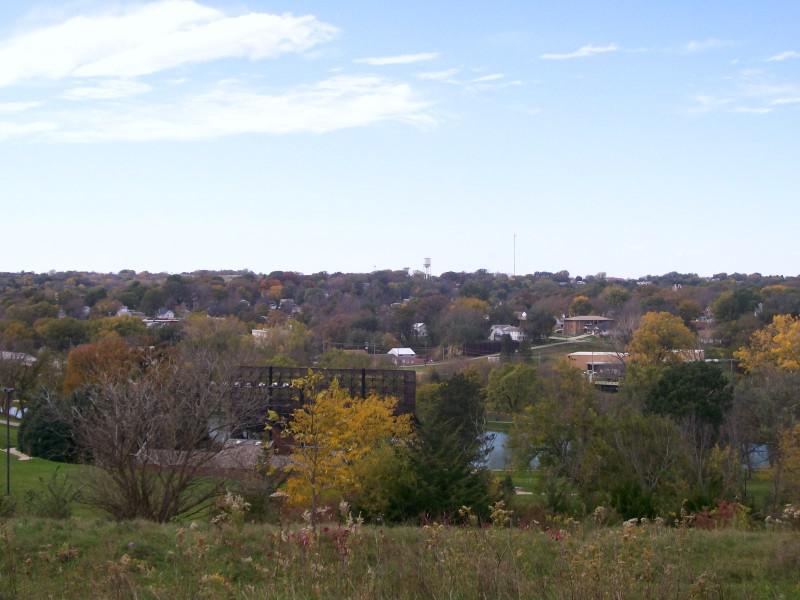
Located in a hollow of the Loess Hills on the east side of the Missouri River, Glenwood was established by Mormons in March 1848 as Coonsville. It prospered during the California Gold Rush largely due to the grain mill on Keg Creek. Coonsville became the county seat of Mills County in 1851, and was renamed Glenwood after most Mormons left for Utah. Glenwood is named for a Presbyterian minister, Glenn Wood. At the end of the Civil War, an Iowa Veteran's Orphans Home was founded here.
The Burlington and Missouri River Railroad was completed through Glenwood in 1869. During the late 19th century, the community was widely known as Iowa's center of fruit production, particularly of apples, and it hosted an annual Apple Carnival. Early industries included an iron foundry, an expansive marble and stone works, the Glenwood Creamery, and a large cannery that covered a city block on the east side of Locust Street. It distributed its products under the brand-name "The Glenwood." Darting & McGavern's "Sanitary" cannery on South Vine and Railroad Avenue canned tomatoes, pumpkin, apples, and beets into the 1920s.
In 1876 the State Veteran's Orphan's Home at Glenwood was adapted for use as the Iowa Asylum for Feeble-Minded Children, the seventh such facility in the country and the first located west of the Mississippi River. The Glenwood facility expanded with increased acceptance of treatment and institutionalization for Intellectual Disability and it became the Iowa Institution for Feeble-Minded Children (IIFMC).
The institution has long dominated Glenwood both economically and culturally, although the IIFMC was self-sufficient and intentionally isolated the residents from the rest of the town. By 1925, the Glenwood IIFMC was the home of 1,555 inmates. The IIFMC became the Glenwood State Hospital School in 1941. By the early 1950s, the facility covered 1,185 acres with a staff of 310 for the 1,968 patients. During the 1970s, the facility completed a transformation from traditional ward buildings into group home-styled cottages. It is now known as the Glenwood Resource Center and provides services and skills training to support people living in communities.
After World War II, the town of Glenwood became a center of meat-packing. During the early 1950s, Glenwood had one of America's largest kosher packinghouses, with most of its product shipped to New York and the East Coast. The packinghouse was later modified to process both cattle and pork; it was bought by Swift & Company and then closed in the 1980s. Meatpacking has moved to sites further west, closer to ranching areas and the old facility is now the location of the SW Iowa Sportsmen Club and Range.
Transportation links include the BNSF, owned by Warren Buffett's Berkshire Hathaway, and U.S. HWY 34 and U.S. HWY 275 pass through Glenwood, along with Interstate 29 just a few miles west of town on the floodplain of the Missouri River. Tourist destinations are the Loess Hills and the National Scenic Byway, although Glenwood is a thriving community with many businesses, community organizations, and local events. Glenwood has hosted several RAGBRAI events. The Glenwood Golf Course was opened in 1964 to be the communities first and only golf course. In 1974, ten years after its opening, a man died on the course. He fell into the creek looking for the ball near hole five. It is rumored that he haunts the hole and players are discouraged from looking for balls in the creek.
